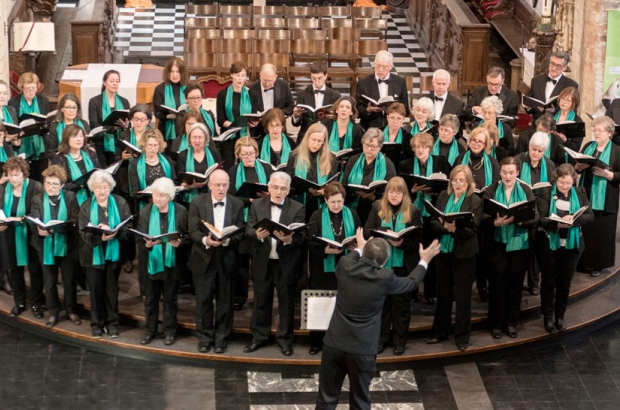- Daily & Weekly newsletters
- Buy & download The Bulletin
- Comment on our articles
Music raises your spirits, says CHS volunteer
At the recent Expat Information Fair at ING, Diane Fresquez told an intriguing story. Fresquez is a member of the International Chorale of Brussels (ICB), an expat choir made up of about 60 internationals. She was taking part in a panel introducing newcomers to the many clubs and associations on offer in the capital of Europe.
Fresquez hates to miss a concert. So one time when she was sick with the flu, she dragged herself out of bed and into someone’s car to sing with the rest of the choir. Dozing in the back seat, she wondered if she would even be able to stand up and sing.
She did, and when offered a ride back home directly after the concert, she found herself replying ‘no, thank you’. She would stay and socialise because she felt better. Cured, in fact.
Science backs up this claim, says Kate Palfrey, a volunteer with the Community Help Service (CHS). Her organisation offers counselling in English to Brussels residents struggling with all kinds of difficulties, including culture shock and isolation in their new home.
All of the proceeds of ICB’s next concert, an evening of Dvořák with the Karski Quartet, goes to CHS to help them continue their valuable services. The two concerts takes place this Friday and Saturday.
Immune boost
“A recent study shows that singing can boost the immune system,” Palfrey says. “It stimulates the limbic system, so it does literally make you feel better.”
Palfrey is a British art psychotherapist, herself fairly new to Brussels. “Singing is about the social connections and about making connections in the brain, but it’s also about expressing things. So if you’re having a hard time, and you go and sing, you can put something of your own into someone else’s words.”
That can be extremely therapeutic, she explains. “It’s about putting something into words, expressing something. You might sing a piece that is about a particular emotion, and you can make meaning out of what you yourself are experiencing. It can be about bypassing the rational side and getting in touch with your emotional life.”
That seems like a good reason to sing, but can just listening to music like Dvořák raise one’s spirits? Certainly, Palfrey confirms. “There are mental health benefits of both listening to and making music. Research shows that listening to music can reduce anxiety, can reduce blood pressure and can even reduce pain. So if you listen to music that you enjoy, it releases endorphins, which helps with pain management.”
Brain synapses
Music also works to keep your mind sharp. “Music is quite structural, it’s quite architectural,” she says. “There’s a relationship between one note and another or one bit of the music and the next. Your brain actually has to do quite a lot of work to make sense of it. So it’s quite good for keeping your brain alive. Using MRI scanners, researchers have found that listening to music isn’t activating just one area of the brain but making connections across the regions of the brain.”
And of course, whether you light out to sing or to sit among fellow internationals in an enthusiastic audience, you’re doing something social. “Making connections and doing things together play a vital role in our health,” Palfrey says. “One recent study found that a good social network can have more health benefits than giving up smoking! It’s about doing something that you enjoy, releasing endorphins, making connections and doing that with other people.”
Dvořák Mass in D Major: 22 November 20.00, St Alix Church, Parvis Sainte-Alixe (Woluwe-Saint-Pierre); 23 November 20.00, Church of the Dominicains, Avenue Renaissance 40. Tickets in advance from ICB




















Comments
It was a very uplifting concert!
It inspired me to join, although there is a waiting list. MEN, in particular, are especially welcome. Tenors are always gold dust in choirs!!!